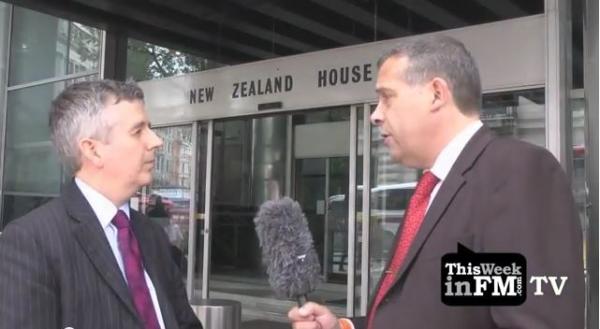- Content
- News
- Work That Pays - 2020 Target to Take One Million (of 5.2 Million) Workers Out of Low Wage Poverty
24 June 2014 | Updated 01 January 1970
Guy Stallard is the UK Head of Facilities at KPMG. He played an instrumental role in KPMG becoming a Living Wage employer as long ago as 2006. He is a member of the Living Wage Foundation Policy Group and has developed the Foundation’s Service Provider recognition scheme. For the full interview - click here
The number of people in low pay in the UK can be slashed by over 1 million by 2020 with a series of pragmatic low-cost measures building on the economic recovery, according to the final report of the independent Living Wage Commission, chaired by the Archbishop of York, Dr John Sentamu.
The report follows the most comprehensive analysis to date of low pay, conducted over 12 months by leading figures from business, trades unions, academia and civil society. It concludes that:
- More than 1 million people can be lifted out of low pay by 2020, with research indicating this will have no adverse economic consequences
- The cost of increasing the pay of nearly 500,000 public sector employees to the Living Wage could be more than met by higher tax revenues and reduced in-work benefits from over 600,000 private sector employees also brought up to the Living Wage
- Professional service firms, such as accountancy and consultancy companies, have nearly 300,000 low-wage staff who could be paid the Living Wage by 2020 and the banking and construction industries could pay the Living Wage to 75,000 employees with an increase to their wage bills of less than 0.5%
- This extension of the Living Wage depends on the government adopting an explicit goal to increase the voluntary take-up of the Living Wage to at least 1 million more employees by 2020
- The measures for the government to encourage such a transition include requiring all publicly listed companies to publish the number of people paid below a Living Wage.
Warning
The Commission warns that, if the government does not support the voluntary extension of coverage of the Living Wage, some working families will continue to rely on emergency measures, such as food banks and unsustainable debt, to get by. Currently 5.2 million people earn less than the Living Wage and the majority of people in poverty are now in working households.
However, the Commission has not recommended the introduction of a compulsory Living Wage, warning that the increased wage bill would not be affordable for some firms in some sectors, such as retail and hospitality and for many small firms.
Benefits
According to the Commission, a Living Wage for the lowest-paid staff can lead to increased productivity, reduced staff turnover and improved morale.
National scandal
The Archbishop of York, Dr John Sentamu, Chair of the Living Wage Commission, said: “Working, and still living in poverty, is a national scandal. For the first time, the majority of people in poverty in the UK are now in working households.
“The campaign for a Living Wage has been a beacon of hope for the millions of workers on low wages struggling to make ends meet. If the government now commits to making this hope a reality, we can take a major step towards ending the strain on all of our consciences. Low wages equals living in poverty.”
Dr Adam Marshall, Director of Policy and External Affairs at the British Chambers of Commerce, said: “The return to economic growth means that many employers are now looking again at increasing levels of pay for their employees after a tough period for business.
“Many thousands of companies already pay their employees a Living Wage, and many more have an aspiration to do so. As the recovery gathers pace, they should be supported and encouraged to make this happen without facing compulsion or regulation, which could lead to job losses and difficulties particularly for younger people entering the labour market.
“Some businesses simply cannot afford to pay a Living Wage just yet – which is why the Commission rejected a compulsory Living Wage. The task now is to support as many employers as possible to make this transition, because paying the Living Wage can benefit employers as well as their staff.”
Frances O’Grady, General Secretary of the TUC, said: “The economy might be growing again but workers – especially the lowest-paid – are struggling to get by as wages continue to lag behind the cost of living. Increasing the number of workers on the Living Wage would help ensure that ordinary people can start to share in the fruits of the economic recovery.
“But as it stands many families simply cannot make ends meet. They find it hard enough pulling together the money to pay for everyday essentials. Trying to come up with extra cash to cover the cost of expensive childcare when the schools are closed for the summer holidays or to replace a broken fridge either means getting by without or going further into debt.
“We now have the perfect opportunity to transform the lives of millions of people in low-paid households. The Living Wage allows families to afford the goods and services that those in better paid jobs take for granted. It means more jobs will pay enough to cover everyday essentials, and that surely is not too much to ask.”
Article written by Brian Shillibeer | Published 24 June 2014
Share
Related Articles
Mercury Rising, Straw Dogs, Hot Fuzz, Top Guns, The Crown & Vikings
We've got an FM Digest so good you'd almost want to make a movie out of it. Mercury have taken the Almac contract; Elior are eliminating plastic straws; Tenon are...
Read Full Article
Skanska Wins Contract for 20 Ropemaker Street
Skanska has won a £240 million contract to construct 20 Ropemaker Street in Central London for Great Elm Assets Limited, in association with Old Park Lane...
Read Full Article
X Marks The Spot Of The Tallest Tower In Town
The City of London Corporation has approved 1 Undershaft - AKA The Trellis - which will be the second tallest building in the Capital after The Shard and thus the second...
Read Full Article
Airline Company Guilty For Unsafe Operation of Passenger Lift
Flybe, the airline company, was sentenced on 4 February 2020 for the unsafe operation of a passenger lift. Meanwhile, a number of other firms have found themselves...
Read Full Article
A Top Ten Guide To Making Your Venue More Accessible
Eight venues have received awards from the disabled access charity Euan’s Guide for their work welcoming disabled visitors – and this prompted ThisWeekinFM to...
Read Full Article
Tackling The People Challenge Through Technology
Report - CBRE and ThisWeekinFM recently lead a delegation of experts to provide a briefing on technology in workplace and real estate strategy.
The breakfast briefing...
Read Full Article
Net Zero Rush-Through Criticised By Lords, Forum Claims
The Global Warming Policy Forum has claimed the House of Lords has rebuked the Government for rushing through a commitment to a Net Zero economy.
The Forum refutes the...
Read Full Article
Holland Match - It's All Gone Gooee Over There
ProptTech history has been made with global M&E firm Croonwolter&dros agreeing to connect the 5,000 commercial buildings it runs in the Netherlands to the...
Read Full Article
'IRA' Claim Parcel Bomb Responsibility In Correctly Coded Call
A claim has allegedly been made on behalf of the ‘IRA’ for the parcel bombs that were delivered to premises in the UK - using a recognised codeword.
A call...
Read Full Article
Emcor UK Takes Insurance On TFM Contract
Emcor UK, has been awarded a contract with multinational insurance company RSA Insurance Group which is being described as a total facilities management contract. It will...
Read Full Article

.gif)
.gif)


.png)

.gif)


.png)

.jpg)





.jpg)




